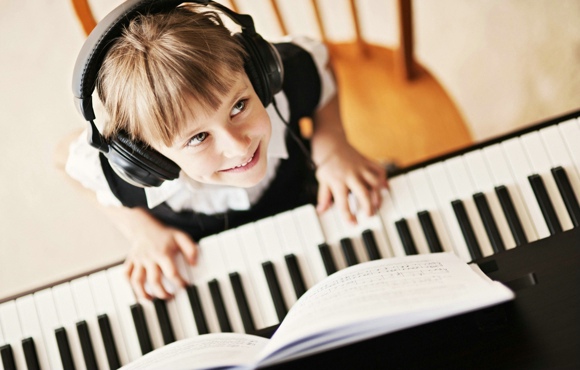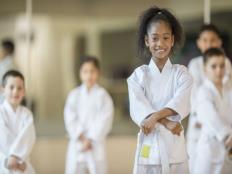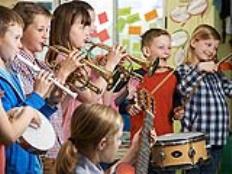With over two decades of experience as an instructor, Eva Brandys is the Founder and Director of Park Cities School of Music & Lakewood Conservatory of Fine Arts in Dallas, Texas. Read on for her expert advice to help you decide when the time is right for music lessons, which lessons to choose and what instrument may be the best choice for your child.
Is my child old enough?
1 of 7
When a kid's curious taps on the piano keys turn to true budding interest, a parent can usually tell. But how old is old enough to start studying an instrument in earnest?
"Generally, it is recommended for a child to start music classes at an early age," says Brandys. She goes on to explain that, while a mature three- or four-year-old may be ready to sit still and pay attention for the duration of a lesson, an energetic seven-year-old may not. When it comes to string, brass and woodwind instruments, parents should also consider whether a child is ready to take on the responsibility of basic care and cleaning that those instruments require.
Private or group lessons?
2 of 7
Private and group music lessons each offer a unique set of benefits. Through private lessons, a child can receive more one-on-one attention and the opportunity for customized lessons plans. They may be the best choice for a child who shows a great deal of interest or talent.
Alternately, group lessons add the element of social interaction, and many kids are also motivated by learning alongside their peers. Financially, group lessons are often more affordable than private.
Is there time in your schedule?
3 of 7
Next, take a careful look at your family's calendar to determine if there is, indeed, enough time each week to devote to music lessons. According to Brandys, parents should plan on 45 minutes to one hour per week for the lessons themselves (plus time for transportation) and up to an additional hour for practice–if not more. "Practice is one of the most important aspects of a young musician's success," she says.
Which instrument is right for my child?
4 of 7
When you're ready to help your budding musician choose just the right instrument, personality comes into play, as well as age. Brandys, a pianist herself, recommends the piano for introverts or for kids who like to work independently. Children who are more outgoing will likely enjoy instruments that offer the opportunity to play in an orchestra or symphony setting as their studies progress.
For the best age to start learning an instrument, the following basic guidelines apply. Keep in mind, however, that all kids are different, and personality and maturity are important factors.
- Violin & Cello: Age 3 to 4
- Piano: Age 4 to 5
- Guitar: Age 5
- Woodwinds & Brass: Age 10 and up
When to say "when?"
5 of 7
"The most important part of any lesson is for the child to nurture an interest that can develop into a love and passion for music," Brandys says. If you sense, or if your child tells you, they aren't connecting with their teacher or enjoying the instrument they selected, it could be time to make a change. Try visiting with new teachers or exploring another instrument first. In some cases, it may even be best to hold off and revisit music lessons in another year or two.
Find the best music lessons near you!
6 of 7
Now that you have asked–and answered–all the right questions, it's time to choose the best music lessons for your kid. ACTIVEkids.com has you covered!







Discuss This Article